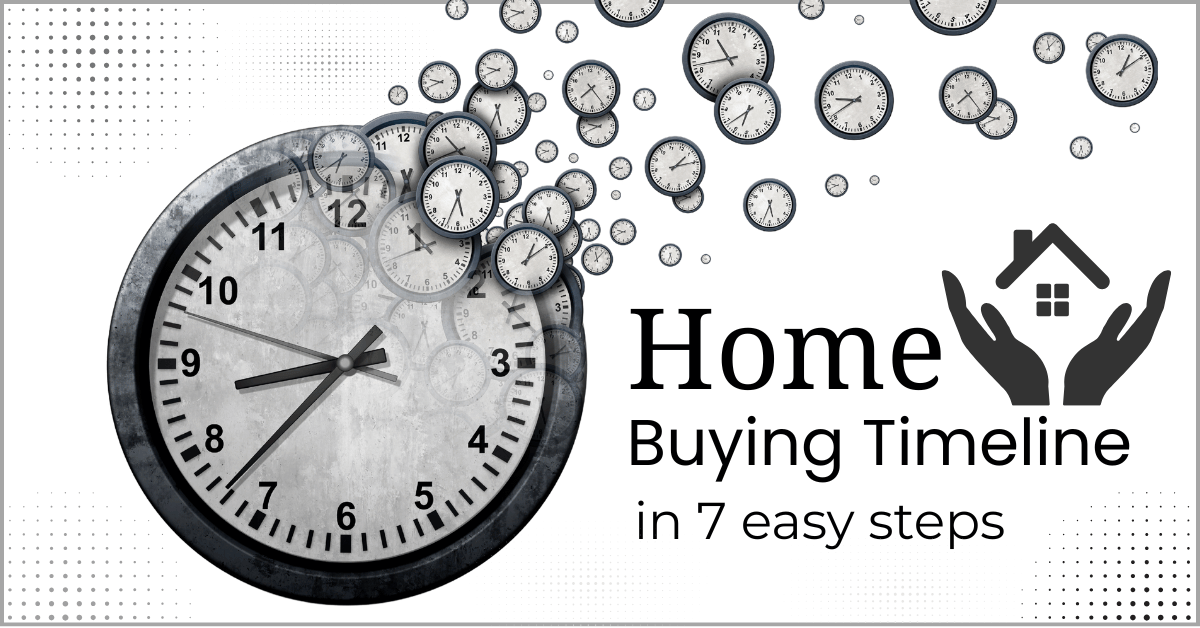How to Speed Up Home Buying Timeline in 7 Steps?
Buying a home is the most important event in a person’s life. It is an exciting and sometimes stressful process that includes financial plans, emotional decisions, and coordination of all rotating parts. Whether you’re a first-time buyer looking for your first home, a family that needs more space because they are growing, or looking for a new property.
Questions like, What steps do I need to take to buy a home? “How can I avoid delays that cost a lot of money? ” is probably going through your head. This guide will answer those questions and more, giving you a clear, practical, and people-centered path to homeownership.
In this detailed guide, the whole process of buying a house is broken down, from getting the money together to moving into your new home. We’ll go over each step, give you an idea of how long it usually takes, point out any problems that might come up, and give you secret tips to make sure you succeed. By the end, you will have a good idea of what to expect, a clear understanding of the process and the confidence to go through it, whether you have bought before.
Table of Contents
Understanding the Importance of the Home Buying Timeline
It is important to know the timetable to buy a home to reduce pressure, keep away from surprises and make smart selections. The system normally takes between months, but matters just like the market, how a whole lot the company is financially prepared, and the variations between regions can change time. When you know what to expect on every step, you could make a higher plan, live tidy and make smart decisions.
Step 1: Financial Preparation and Mortgage Pre-Approval

Building a Solid Financial Foundation
Timeline: 1 to 3 months (faster if you have good credit and keep your papers in order).
Getting your financial matters in order is the first step in the process of buying a home, just before you see your first home. This step is very important because it helps you figure out your budget, creates confidence with the lender, and sets the tone for the whole process.
Steps to Financial Preparation
Check your credit score rating: Your credit score rating is one of the maximum critical pieces of information you need to get a loan with good terms. If your credit rating is above 740, you could get the best rate. If your score is below 620, you may need more work to improve your credit.
- Step: Get your free credit report from AnnualCreditReport.com and test it for mistakes. Correct any errors proper away.
- Tip: To improve your score, pay off bills with high interest rates, don’t take out new credit lines, and always make your payments on time.
Organize your financial papers: lenders will ask for a full set of documents, such as
- Pay stubs from the last 30 to 60 days
- Tax forms from the previous two years
- Checks from the previous two to three months
- Proof of other pay, like commissions or side jobs
- Proof of debts (like car loans and school loans)
- Tip: Keep scanned copies of these files in the digital folder so they are easy to find.
Make a budget. As a general rule, your monthly housing costs (mortgage, taxes, and insurance) shouldn’t go over 28% of your income, and your overall debt, which includes housing, shouldn’t go over 36%. Think about:
- A down payment of 3 to 20% of the home’s price is common.
- Costs of closing (2–5% of the home price)
- Taxes and insurance for homes
- Maintenance costs and emergency funds
- A 10% down fee on a $300,000 house is $30,000. Closing costs may be from $6,000 to $15,000.
Save for Extra Costs: Besides the down payment, you must additionally plan for transferring costs, furniture, and repairs that arise suddenly. Having three to six months’ worth of living costs saved up is a good rule of thumb.
Common Financial Mistakes to Avoid
- Costs Not Considered Enough: A lot of buyers only think about the down payment and don’t think about taxes, upkeep, or closing costs.
- Overextending your budget: Trying to buy your dream home with too little money can put a strain on your finances. Stick to the limit you set up front.
- Neglecting Credit Health: If you make late payments or have high credit card balances during this time, it can hurt your score and make it harder to get a loan.
Expert Tip
If the negotiation stops, offer to pay for a small fix, or let the seller return the lease if the seller needs more time to proceed.
Step 2: Home Inspection, Appraisal, and Loan Underwriting
Conducting a Professional Home Inspection
Deadline: 2-5 days (if problems require further research)
A professional home inspection is an important step to find problems with building construction, systems and safety.
What’s Included in a Home Inspection
- Foundation, roof, and walls are structural elements.
- Systems: HVAC, plumbing and electricity.
- Mold, asbestos, radon, or code issues are all concerns of safety.
Using Inspection Results
- Renewal: If there are major problems, ask for repairs, low-cost or seller credits.
- Let: If issues are large (such as foundation cracks), use your inspection plan to get out of the house.
- Plan: You can set aside money for small problems like old wires after you buy the house.
Expert Tip
You can ask questions and see problems for yourself by going to the review. Hire an inspector who is qualified and has a good reputations.
Step- 3: Appraising the Property

7 to 20 days
The lender needs an appraisal to ensure that the loan amount is equal to the home’s worth. A certified appraiser appears at the house and compares it to comparable homes that have recently bought.
Appraisal Outcomes
- Matches or Exceeds Offer: The loan goes through as planned.
- Less than Offer: If the assessment condition is met, you can have to renegotiate the rate, pay the difference in cash, or stroll away.
- Say you provide $300,000, however the appraisal says it is really worth $280,000. You may have to pay an additional $20,000 or ask the seller to lower the price.
Expert Tip
Give the evaluator comparable homes to look at, especially if your home has unique features that make the price fair.
Step- 4: Title Search and Insurance
2 to 3 weeks
If there are no liens, disputes, or ownership problems on the property’s title, a title search makes sure that it is clear. Title insurance keeps you and the lender safe from claims in the future.
Why Title Search and Insurance Matter
- Finds problems like unpaid taxes, easements, or relatives who haven’t been named.
- Make sure that you officially own the house after the closing.
Expert Tip
Carefully read the title report and ask your lawyer or the title company to explain anything that doesn’t make sense.
Step- 5: Mortgage Underwriting Process
2 to 4 weeks
Underwriting is the last step the lender takes to look over your finances and the property. The inspector checks to see if:
- There have been no big changes to your credit, income, or assets since the pre-approval.
- The value and state of the property (based on an appraisal and an inspection).
- Meeting the conditions of the loan program.
Common Underwriting Challenges
- Job Changes: Losing your job or switching jobs can slow down or stop the approval process.
- New Debt: Don’t buy big things like cars or furniture while the loan is being approved.
- Documents That Aren’t Complete: Delays in sending the information that was asked for can slow down the process.
Expert Tip
Talk to your lender once a week to make sure that the screening process is going as planned. Within 24 hours, you must respond to calls for more documents.
Step 6: Contract to Closing

Preparing for a Smooth Closing
3 to 7 days
In the last few stages, you need to tie up any loose ends to ensure that the close is smoothly.
Reviewing the Closing Disclosure
- At least three days before the closing.
- Goal: Loan terms, monthly payments and closure costs.
- See each line for errors, such as the amount of an incorrect loan or a missing fee.
- Tip: Look for differences between the Closing Disclosure and the Loan Estimate you got before the loan was approved.
Conducting the Final Walkthrough
- When: 24 to 48 hours before the store is closed.
- Goal: Check the state of the property, make sure the repair is complete, and make sure any items included (such as devices) are still.
- Bring a list with you and tell your agent about any problems immediately.
Navigating Closing Day
- Timeline: One to two hours.
- What happens: You sign the mortgage papers, send money (by using a wire or cashier’s check) and get keys.
- Photo ID, proof of cash, and insure your home.
- Tip: If no rules are clear, ask questions before you sign.
Step 7: Moving In and Settling Down
Post-Closing Actions
Timeline: one to two weeks after closing
Once the deal is done, you need to settle into your new house and finish any loose ends.
Key Post-Closing Tasks
- Set up utilities: Before you move on, make sure you have services for waste, water, power and gas.
- Plan your movers: Rent a professional mover or rent a truck as soon as possible.
- Change your address: Post Office, Banks, Membership Services, and tell the Government where you live.
- Maintenance plan: Keep money in your budget for regular maintenance such as yard care and HVAC service, and create an emergency repair fund.
- Keep them safe: Keep closed papers, warranty and inspection records in a safe place.
Expert Tip
Make a home care calendar to help you remember to do things like replace air filters, check the roof, and fix broken appliances.
Average Timeline for the Home Buying Process
Time Frame Estimated
- Before Approval: 1 to 3 days
- Picking an Agent: 1 to 2 weeks
- Look for a House for: 1 to 3 months or more
- Dealing with an Offer: 1–7 days
- Checking and judging: 2–4 weeks
- Processing and reviewing loans takes: 3–4 weeks
- Last Minute Preparations and Steps: 3–7 days
- Average Total (From Open to Close): 4 to 6 months
Key Insights and Common Buyer Pitfalls
Strategies for a Successful Home Purchase
- Start early: Start getting your financial matters in order and collecting documents 6 to 12 months before the time.
- Choose trusted professionals: Talk to real estate managers and lawyers to find the best screws.
- Learn your budget: Add all costs like down payment, closed costs, tax and maintenance.
- Be responsible: Talking to lenders, agents, and buyers quickly prevents things from taking longer.
- Change in your money: During the process, do not take on any new debt or switch jobs.
Mistakes to Avoid
- Observe observations: If you leave an observation to save time or money, you can end the need for expensive updates.
- Emotional decisions: If you fall in love with a house, you will not overdo or see its mistakes.
- Costs Not Considered Enough: Forgetting about moving costs, taxes, or closing costs can put a strain on your funds.
- Ignoring Market Trends: If you don’t change your offer when the market is hot or cold, it could lose value.
- Delaying Responses: If you don’t talk to people quickly, you could lose a home in a competitive market.
Simplified Home Buying Process Flow Chart
- Prepare Finances and Credit → Make sure you have a solid financial base.
- Get pre-approved for a mortgage to make sure you can afford it and to improve your offers.
- Pick an Agent/Attorney and get your support team together.
- Look for Homes/Tour → Discover the ideal home.
- Make an Offer or Negotiate: Make a strong offer to buy the house.
- Home inspection or appraisal: check the property’s condition and worth.
- Title Search/Insurance: Make sure it’s clear who owns the property.
- Mortgage Approval or Underwriting → Finish your loan.
- Get the Closing Disclosure and look over the final terms.
- Final Walkthrough → Make sure the home is in good shape.
- Finish the sale or move in. Sign the papers and begin your new life.
Advanced Strategies for Experienced Buyers
For those who are generally dealing with homes or complex markets, here are some advanced tips:
- Use market data: To find valuable homes or new neighbors, use tools such as Redfin’s market insights or local MLS reports.
- Escalation Close: If there are other bids, you should include an escalation clause that will automatically increase your cost (to the limit).
- Offers in cash: If you have money on your hands, you can make an offer in cash to stand out. You could then refinance later if you want to.
- Properties that aren’t on the market yet: Ask your agent to look into pocket sales or pre-market homes where there is less competition.
- For rental or flip properties, you should look at the property’s cash flow possibilities, repair costs, and resale value instead of how it makes you feel.
Frequently Asked Questions
How long does it take from beginning to end to buy a house?
It usually takes between the months of 4 to 6 months, but if you are well prepared and the market is not very competitive, it can move quickly (2 to 3 months), or if many situations make it hard, such as pre-payments or lack of goods.
Can I speed up the process of getting a house?
Yes! Some steps to speed up are:
- Getting financial papers ready early.
- Getting pre-approved before looking for a house.
- Getting help from an agent with a lot of experience who knows the local market.
- Quickly responding to requests from lenders and sellers.
- Shopping when there isn’t as much competition, like in the winter.
How long does it usually take to process a loan?
It usually takes three to four weeks in the process of loan processing and qualifying, but if all paper operations are in order, some lenders can speed up items for up to two weeks.
Is it possible to do everything at the same time?
Some steps, such as budgeting and choice of agent, can take place at the same time. But steps such as observation, evaluation and closing are to be followed in a certain order to follow the law and meet the standards of the lender.
What should I do if the evaluation is low?
- Cash the difference.
- You can leave without being punished if you use an evaluation contingency.
- Ask for a second evaluation (this works).
What should I do to make my offer stronger? Should I waive the conditions?
If you waive conditions like inspections or financing, it can make your deal more appealing, but it also raises the risk. Before giving up any rights, talk to your agent and lawyer.
Read more blogs
12 Proven Tips for Selling a Home with a Pool Fast
19 Open House Scripts to Close More Deals This Year
